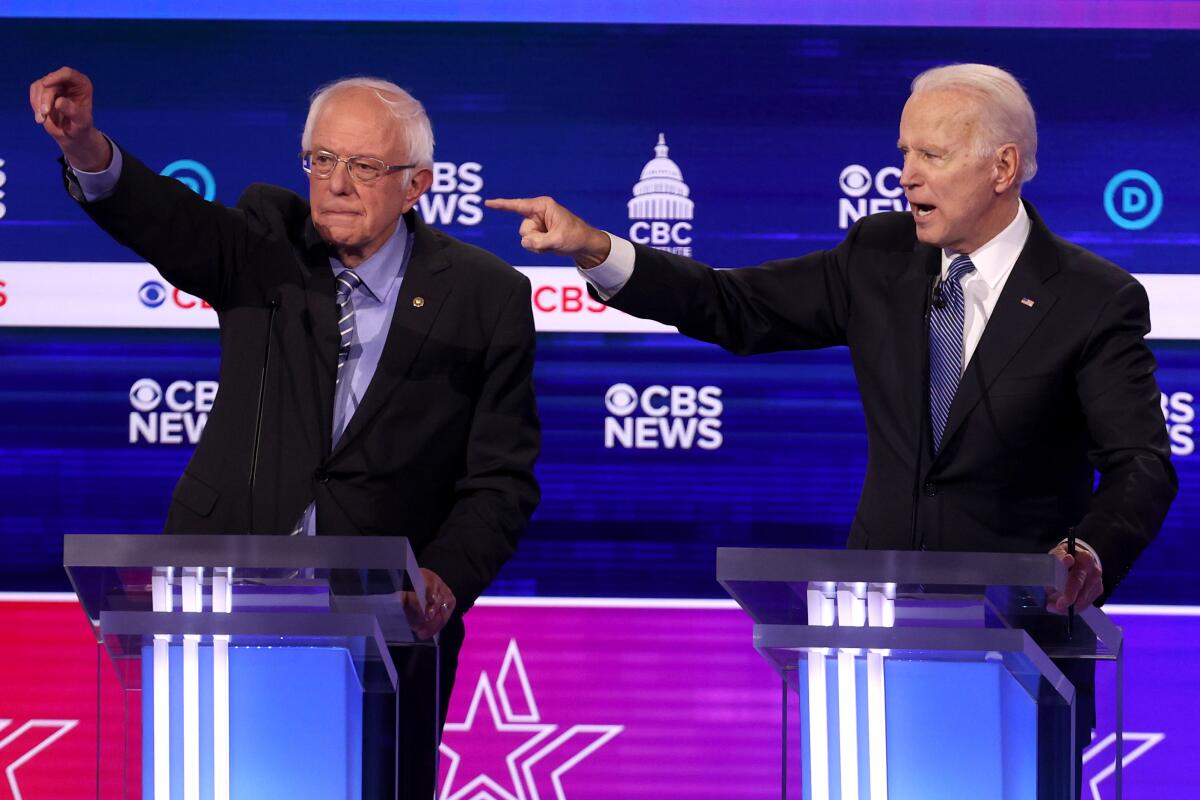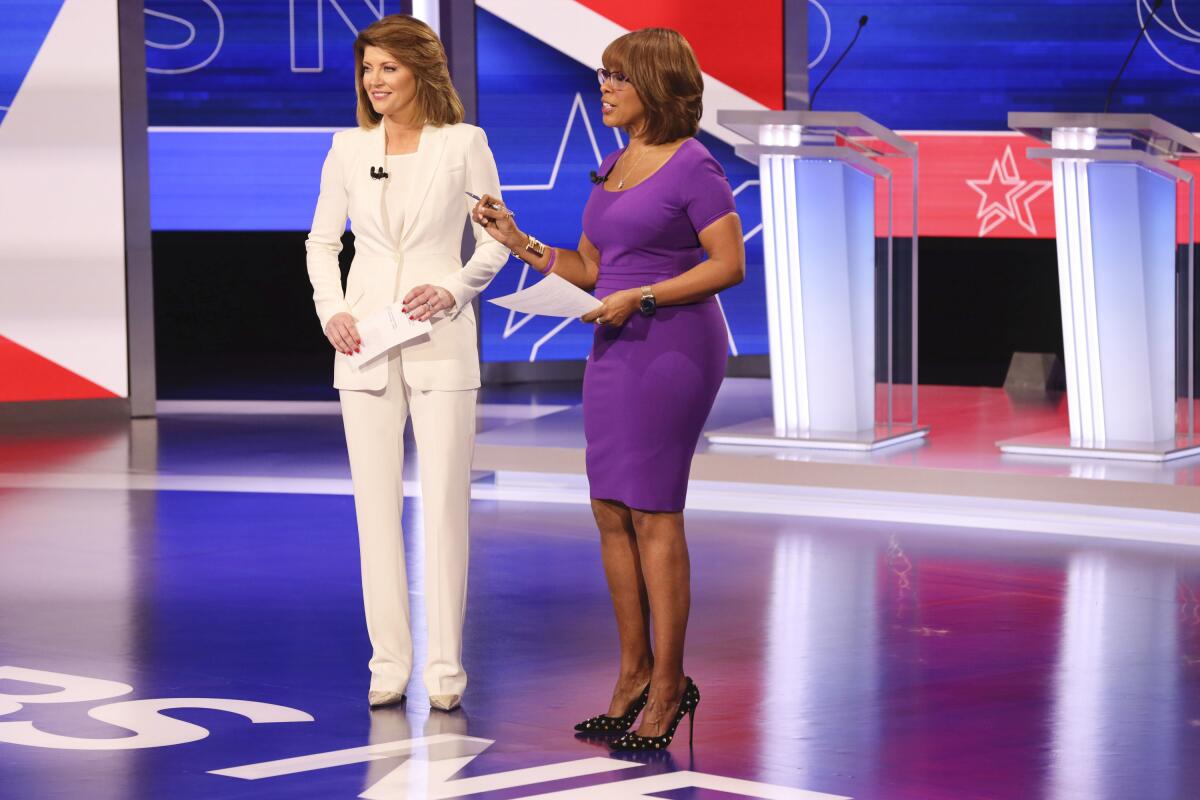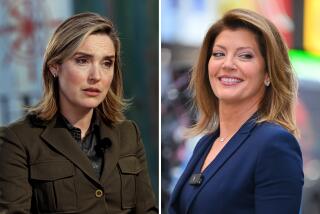Fiery Democrats create a chaotic debate for CBS News

- Share via
Charleston, S.C. — For the 2020 Democratic presidential contenders trying to stop front-runner Sen. Bernie Sanders of Vermont, the debate Tuesday in Charleston, S.C., was an elbow-throwing fight for survival.
The team at CBS News that produced the telecast from the Charleston Gaillard Center could empathize. The storied division underwent serious upheaval in the past year with a new president and anchor changes on its evening newscast and morning show that are fighting to hold onto viewers.
The tenth Democratic primary debate was the first chance for a revamped CBS News to show a potentially massive audience that it can hold its own with the larger and better-funded competitors in the fragmented TV landscape.
But with so much on the line before Saturday’s South Carolina primary and the 14 states including California that vote on March 3, Super Tuesday, the candidates took a no-holds-barred approach that led to chaos at times. And critics on social media and some political analysts were not kind to the unruly proceedings, claiming moderators Norah O’Donnell of the “CBS Evening News” and Gayle King of “CBS This Morning” had trouble maintaining control.
CBS News’ rivals, in a sign of the intense competitiveness of the TV news business, were quick to share the negative online comments with reporters after the two-hour debate.
In an interview after the debate, CBS News President Susan Zirinsky shrugged off the barbs and defended her team. She believed the network delivered a strong debate that covered a wide range of issues not extensively discussed in previous face-offs.
The aggressive attacks by the seven candidates on stage were to be expected, Zirinsky added, as Sanders could accrue an insurmountable lead in the number of delegates needed for the nomination by next week.
“After next week there are going to be a lot fewer people on that debate stage,” Zirinsky said. “We’re at the precipice of the most dynamic part of the campaign.”
The rough-and-tumble session shown Feb. 19 on NBC and MSNBC demonstrated there is an appetite for the feisty exchanges, with nearly 20 million viewers, a record for a primary debate. The CBS debate - which was simulcast on cable networks BET and BET Her - also performed well, drawing 15.3 million viewers according to Nielsen data.
Asked if the network plans to pursue another primary debate in this campaign season, Zirinsky replied, “You bet.”
CBS News counted on the debate to be a high-profile platform for its on-air talent.
O’Donnell and King were joined on stage by “Face the Nation” moderator Margaret Brennan, chief Washington correspondent Major Garrett, and “60 Minutes” correspondent Bill Whitaker. Zirinsky also convinced CBS to provide an hour for a post-debate analysis featuring the anchors and correspondents from CBSN, the online streaming news service the division has operated since 2014. It was a chance for a wider audience to see the live post-debate coverage the digital service has been offering throughout the campaign season.
The network’s news stars took notice of the upgrades. Hours before taking her place at the moderators table, O’Donnell was admiring the setting for that night’s event on the majestic stage from a seat in the audience at the Gaillard. The massive digital screens and dramatic red, white and blue spotlights illuminating the stage of the hall — a look created with the help of a producer who has worked on the Oscars — had a showbiz feel that has been missing in the network’s special event coverage in recent years as the division was under pressure to contain costs.
“This is a new era,” she said. “They have spared no expense.”

Without disclosing how much CBS shelled out for the showcase, Zirinsky acknowledged that “packaging adds to the excitement of the moment.” She looked at the network’s first debate of 2020 as an opportunity to enhance the news division’s image.
There are also new bosses to impress now that Viacom and CBS have merged. The logo of the new corporate parent, ViacomCBS, occasionally flashed on the screens on the debate stage.
The monthly match-ups of the candidates sanctioned by the Democratic National Committee have drawn big audiences for CNN and NBC, which led Zirinsky to have what she described as “debate envy.” But her deputies — Chris Isham, the Washington bureau chief, and Caitlin Conant, the division’s political director — urged her to wait until later in the campaign cycle when the large field of candidates winnowed down.
While viewer interest was bound to increase for the later contests, so was the ferocity of the dialogue of the candidates. The NBC debate in Las Vegas was loaded with heated attacks from the candidates who steamrolled through time allotments for answers — a precursor of what was ahead for CBS.
“Obviously the stakes get higher, especially for the candidates who are trailing, and the intensity level is going to rise,” Isham said beforehand. He noted there was a concern that candidates would talk over each other and the moderators, as they did last week on NBC when former New York Mayor Michael R. Bloomberg, a free-spending late entry in the race for the nomination, came under heavy fire.
CBS News executives and moderators believed they were in for a “food fight” in the first half of the debate when the subject was Sanders’ ability to beat President Trump in the general election, now the most contentious issue for the Democrats. They spent hours attempting to prepare for the mayhem that ensued onstage.
The network used its campaign embeds — the young reporters and producers who have spent months on the road following the candidates to rallies and appearances around the country — as surrogates in mock debates.
Most of the sessions took place in hotel conference rooms so that Democratic Party officials and campaign staffers did not hear questions ahead of time. The Times was allowed to observe a technical rehearsal at the Gaillard on Monday where camera angles, lighting and timing of the debate could be worked out.
Farcical questions that would not be used in the actual debate were offered up to the surrogates who gave real responses in the character of the candidates. They replicated the familiar talking points, rhetorical flourishes and interruptions.
Garrett, who participated in the sessions, said even with the preparation, trying to determine how much the moderator can push back at the candidates and force them to follow the debate rules is often a no-win proposition.
“It’s a different role to be the lion tamer,” Garrett said. “If you’re too much of one, it sounds like you’re interfering and putting your thumb on the scale. If you’re not enough of one, it’s ‘why don’t you have any control?’”
Brennan noted there is simply no template to deal with a presidential campaign that now includes a leading candidate who is willing to praise aspects of left-wing dictatorships as Sanders did in an interview last Sunday on “60 Minutes.” She said such a remark would have been disqualifying in the past.
“What Bernie Sanders does is talk about an America that needs to atone a little bit and an America that made mistakes,” Brennan said. “The country is arguing about who we are. I don’t think we’ve figured out how to talk about that. I don’t know that a debate gets to it.”
King acknowledged before the debate that she felt a mixture of “terror and exhilaration” in the days before taking the stage. She even went the extra mile when she decided against the bright green dress she chose to wear, as O’Donnell was planning to wear red.
“I didn’t want it to look like ‘Merry Christmas,’” King said.
The morning host had an assistant go to her home back in New York to pick out an alternative. King showed a series of texts directing the assistant to various parts of her apartment to locate dresses and accessories, and bring them down to Charleston.
“I know it sounds very lofty to say ‘can someone bring me my clothes!’” King said. “But I think there is too much at stake and I wanted to get it right. Part of the comfort level is that you feel good about what you have on.”
King went on the air resplendent in purple. But O’Donnell changed things up too. She decided to wear white.
More to Read
Inside the business of entertainment
The Wide Shot brings you news, analysis and insights on everything from streaming wars to production — and what it all means for the future.
You may occasionally receive promotional content from the Los Angeles Times.










